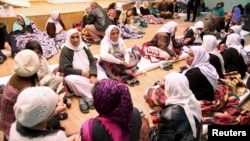The Yazidi family mourned her death, assuming she had been killed by Islamic State militants or exposure to the blistering summer sun in northwest Iraq, but 15-year-old Suad Shaker Qassem was still alive.
Over the weekend, she was released along with around 200 elderly, disabled and infirm Yazidis after five months in Islamic State captivity.
"I couldn't believe it,'' said Kawal Shaker Qassem, 26, who found out his sister was among them when one of his friends recognized her in a photograph and called him. "I came straight here.''
Suad, who is severely disabled, lay under a blanket in a reception hall in Lalesh, the most sacred place for the minority Yazidi faith. Here, far from the dangers of Islamic State, those released were reunited with relatives who had given them up for dead.
The homecoming was bittersweet. The released Yazidis said they could not be at peace knowing that many of their loved ones remained in Islamic State hands.
A horrible choice
Last August, as Islamic State attacked parts of northern Nineveh province, long controlled by Kurdish security forces, and threatened to overrun the Kurdistan regional capital Arbil, the Yazidi minority fled their villages; thousands sought refuge on nearby Sinjar mountain.
Those too old or weak to get away were left behind.
Fleeing their village of Tel Qasab, the Qassem family piled into a car but it broke down, so they were forced to continue on foot.
Suad, who is unable to walk alone, was carried on her brother's back. Their father, who had suffered a stroke, was falling behind.
"My brother called me and said I can't carry her any longer,'' said Qassem, who was in Kurdistan at the time. "He said I have two choices: either to save my sister, or my father. I am going to leave her here.''
Suad cannot say what happened to her, but the other Yazidis said they had been shunted from place to place by the militants, resigned to the prospect each day might be their last.
Odyssey through hell
Islamic State militants had caught up with them as they tried to get away and told them to return home, assuring them they would not be harmed.
Days later, they were rounded up into groups and taken to different villages, where they were kept under house arrest.
The militants brought them food, which they said was often too little, or expired. One man said he and around 570 others had been held for three months in the village of Kucho.
"We were just sitting around,'' he said. Others said they had stayed in the town of Sinjar itself.
Most of them lost track of time, but said they were eventually herded into empty schools and taken to Tel Afar, a city west of Mosul.
Young women were separated from old, and Islamic State emirs took the most attractive as trophies.
From there, some were moved on to Mosul and Badush jail, where 59-year-old Sahwa Iyas Hussein found Suad among hundreds of other imprisoned Yazidis and took care of her until they were freed: "I took pity on her.''
Aftermath
When Islamic State militants ordered them onto buses early on Saturday, the Yazidis thought they were being led to their execution. Instead, they were dropped off at a bridge crossing into Kurdish-controlled territory.
None of them had expected to survive, let alone walk free.
"We considered ourselves dead,'' said Mahal Fares Qassem, 35. It is not clear why Islamic State, which considers Yazidis devil-worshippers, decided to release them.
Some said they had been told the extremist group's leader Abu Bakr al-Baghdadi himself had issued a pardon, and others speculated they had been part of a swap.
"There are always people who have mercy, even in the Islamic State,'' said 45-year-old Khafshe Mrad Gernous, five of whose relatives are still unaccounted for. "I'm glad to be free but as long as my family is captive,
it's as though I'm not alive.''
Sitting beside her, Finale Hassan Haji, 15, said she had saved herself from a worse fate by following her mother's instructions to act dumb.
Rumors circulated they might have been infected with some kind of disease to transmit back to the Kurdish region. Hama Fares Khodeida Kheder, 59, concluded they were simply worthless.
"Look at us! We are all old and decrepit. We weren't of any value to them,'' said Kheder, who was sitting at home in his wheelchair when the militants arrived.
Paralyzed from the waist down, he made no attempt to escape.
"They said convert to Islam or we will slaughter you, so we said the shahada,'' he smiled, referring to the Islamic declaration of faith. "What were we supposed to do?''
Many of them shriveled with age and wrapped in blankets, the released Yazidis said they had not been abused.
Doctors wearing protective suits inserted syringes into spindly arms, taking samples of blood to test for HIV and Hepatitis.
One elderly woman died just hours after being released, and there are several suspected cases of Tuberculosis. A number are suffering from a skin condition known as "Baghdad Boil,'' which manifests as open sores on the body. Others appeared to be psychologically scarred.
A disheveled woman wandering around the hall yanked a mattress from beneath two other Yazidis and sat down on it herself. "Go and find Nawaf!'' she said quietly and then shouted: "I am Nawaf!''
A representative of the Yazidi spiritual leader Baba Sheik said community leaders feared she had lost her mind and said they had no idea who the woman was or where her family might be.
Outside the hall, the conical domes of the Lalesh temple towered over tents housing more than 100 Yazidi families. Inside the temple, worshippers circled the grave of Sheik Adi, one of the most revered figures in the Yazidi religion.
"Oh Sheik Adi!'' cried an elderly woman, throwing up her hands in supplication. "Take revenge against Islamic State for us.''





